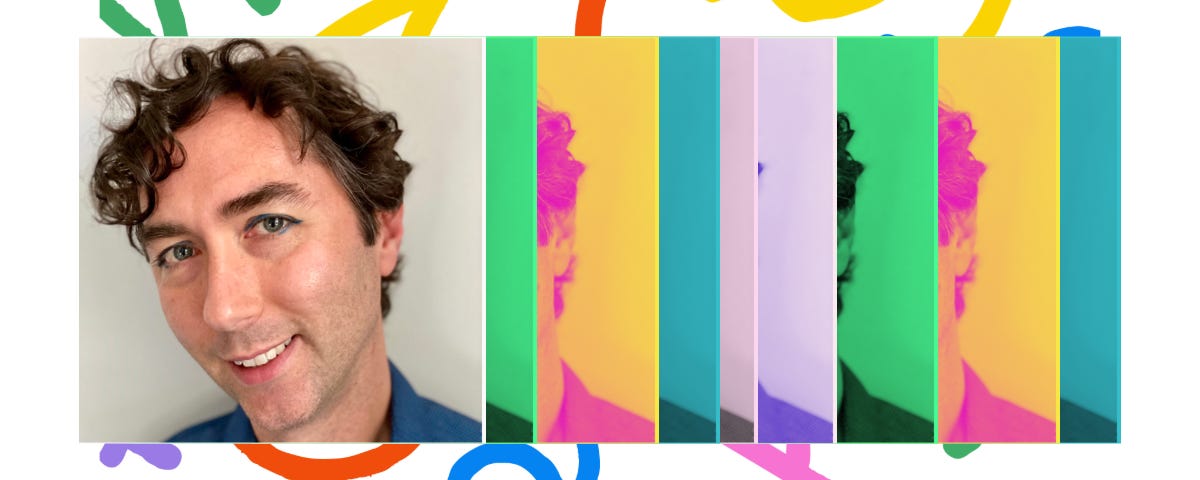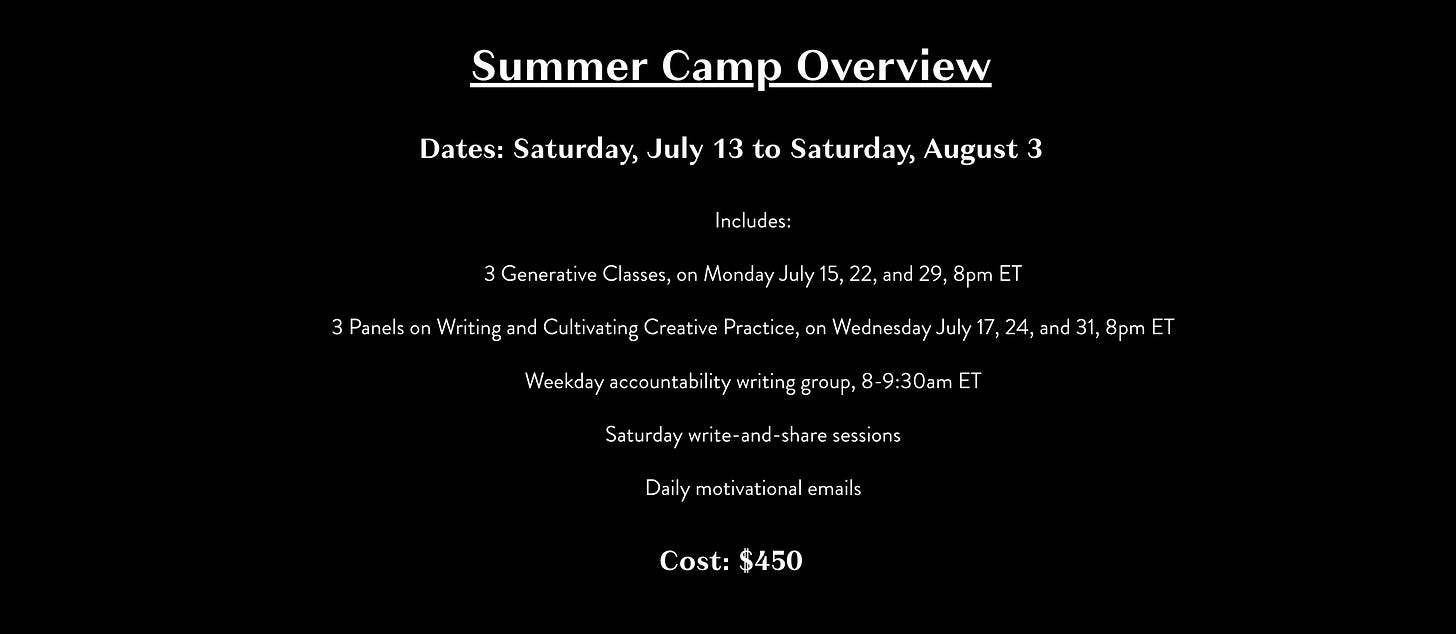I’ve been running Millennial Writer Life for a few years, compiling writing opportunities and various reflections on the writing life. But today is a new opportunity that MWL has not had before - an interview with a writing cooperative called The Writing Co-Lab.
Established in 2023 by Brian Gresko, Sara Lippmann, and Amy Shearn, Writing Co-Lab is a teaching cooperative driven by artists dedicated to the craft, community, creativity, and the power of written expression. Co-Lab offers unconventional educational opportunities, with instructors covering a wide array of topics—from refining work for publication to exploring new styles and techniques—all while fostering enjoyment in the writing process. Embrace the journey of artistic development with us, whether reigniting your passion or taking your first steps into writing.
You may also be asking yourself? What is a cooperative and how does it apply to a writing space?
At Writing Co-Lab, administration duties are shared among three coordinators, all of whom are teachers within the cooperative. From newsletters to promotional graphics and community events, these tasks are handled by the teachers themselves—there's no paid administrative staff. We collaborate closely, pooling our efforts to ensure everything runs smoothly. Moreover, the teachers have personally crafted each class. As owners of this cooperative, nearly all of the student tuition (over 90%) directly supports the teacher leading the class. While we may operate at a slower pace than traditional businesses due to our structure, please rest assured, we will respond to your inquiries in due time. Your patience is appreciated as we strive to provide the best possible experience.
For a second, I got to sit down with Brian Gresko, one of the founders.
An Interview with Brian Gresko, a Writing Co-Lab cofounder
Millennial Writer: Life: What was the catalyst for starting Writing Co-Lab in 2023?
Brian Gresko: Two things, and they’re related: community and ethics.
In my nearly ten years of teaching for businesses that run continuing ed classes for writers, I heard the word community a lot yet rarely saw it in action. Students didn’t get a chance to meet up, nor did these organizations make opportunities for the teachers to interact with one another, either in an informal, friendly way, or to discuss pedagogy and share ideas. I think that’s deliberate, because these businesses are built on exploiting their teachers. Most of the ones I worked for never offered raises, let alone professional development. And when it came to our fees, these orgs took huge chunks out of the student tuition — often more than fifty percent. The teachers were cogs in a machine selling dreams of corporate publishing to hungry writers, but Big 5 publishing isn’t the right path for every writer, so in some ways the students were being preyed upon too.
In 2022 I finally felt fed up with being part of this system. I have long been a member of cooperatives. I believe that by working together artists can build organizations that better serve them and their art, and that values their labor, and encourages collaboration in a way that sustains our spirits and broadens our possibilities. Sara Lippmann and Amy Shearn, both authors and teachers and human beings I greatly admire, were involved in planning the co-lab with me from the start.
We envisioned an organization that didn’t just sell classes, but which also made space for students to gather outside of the classroom, like open mic events, writing clubs, and “Ask Me Anything” sessions with faculty (these have been free, and happen both online and in person). Each semester, we bring the faculty together as well. And by asking our teachers to contribute administrative chores — whether that be something light, like writing a newsletter, or more involved, like running the co-lab Twitter/X feed — we’re able to keep administrative costs low, so we provide between eighty and ninety percent of the student tuition directly to the teacher.
This is vastly different in ethics and in operation to any of the organizations I worked for in the past, and I believe it is ultimately better and more sustainable for the teaching writers. As for the students, the classes Writing Co-Lab offers tend to be unique because they spring from the individual teacher’s passion for reading and craft. They are driven by the desire to help our students develop and sustain a lifelong relationship with their creative selves.
Millennial Writer: Life: What surprises have you had along the way in this work, in terms of helping writers engage in craft and the writing life?
Brian Gresko: We expected to collaborate with our amazing faculty, but we didn’t anticipate how the students themselves would contribute to the organization. We’ve had students provide help in marketing and promoting our classes, and submit ideas for classes and events which we’ve been excited to enact. It’s been moving to see how excited students are to connect with one another at the co-lab events. Even our newsletters, which are typically written by a different faculty member each week, give students the sense that this is a different kind of organization, it’s a human endeavor. Their enthusiasm and passion for the co-lab has been inspiring to witness.
Millennial Writer: Life: What advice would you have to writers nervous to take a class or pursue a more structured way of developing craft?
Brian Gresko: Don’t take a traditional workshop! The critical energy they tend to channel can kill your creative spirit, especially when you’re first starting out. Instead, try a generative class. Some of our more popular ones, like Amy Shearn’s “Writing for Women on the Verge,” or Mallika Rao’s “The Radical First Person,” or Natasha Oladokun’s “Fear Not! Poetry for Beginners,” are geared toward new-ish and emerging writers. The teachers introduce the students to work they might not have encountered before, lead discussions on craft, provide prompts which inspire the students’ writing, and facilitate roundtables where the students get and give constructive feedback on their early drafts. The stakes are low – everyone is exchanging work they created in or for the class, they’re not sharing things they’ve toiled away on for years. And these teachers, and I would say this about all of the Co-lab teachers, are warm, encouraging voices who love literature, and want to get students stoked about it.
The response to these classes has been so popular that this year we’re debuting a summer camp geared toward new and emerging writers who want to commit to their practice for three weeks in July. Many of the established summer programs ask writers to apply with samples, and they can be socially intense, and expensive. Ours is designed for a writer who might also have job and family obligations — it’s entirely online, either synchronous or asynchronous — and it’s low cost. We hope the camp is a good way for a student to dip their toe into the literary world, and also have fun generating work within community.
Millennial Writer: Life: Why are spaces like Writing Co-Lab important within the larger writing industry?
Brian Gresko: For students, Writing Co-Lab provides a restorative haven to find inspiration, comfort, and support for their creative endeavors. We have extremely practical classes, don’t get me wrong, but we resist the bullshit capitalist narratives that you’re only a writer if you publish a book and you’re only a good writer if you sell a lot of copies of that book. We believe in the power of art to transform the artist, no matter where they are in their journey. And we offer classes in fiction, nonfiction, poetry, screenwriting, translation — we take a wide view of what constitutes literature.
From a teaching artist perspective: Corporations do not have our best interest at heart, nor do wealthy patrons. We cannot work ethically and be fully our fully human selves within a capitalist system built on injustice and dehumanization. If this sounds dire and slouching toward dystopia, well, that’s the world we live in! But I do find lightness and inspiration in being around other creatives engaged in making art that resists the destructive powers-that-be. Writing Co-Lab values the labor involved in that work, and the radical possibilities of teaching, and the potential of writing to transform the reader who encounters it with an open mind and heart. We’re thrilled to keep growing the organization with the input and assistance of our amazing teachers.
Millennial Writer: Life: Is there anything else you’d like to add?
Brian Gresko: The best way to keep up with what Writing Co-Lab is doing is by joining our weekly newsletter, which you can do right here.
About Brian…
Brian Gresko (they/he) is a writer, illustrator, and educator based in Brooklyn. They've contributed to Slate, Longreads, The Atlantic, and more. Gresko edited the anthology When I First Held You and co-runs Pete's Reading Series. They've taught workshops for over a decade at places like Catapult and the New York Public Library. A founding member of Writing Co-Lab, they hold an MFA from The New School and graduated from Oberlin College with a self-designed major in "Narrativity in Film."








💖💖💖
This is so great— thanks for featuring Brian and the co-lab!!